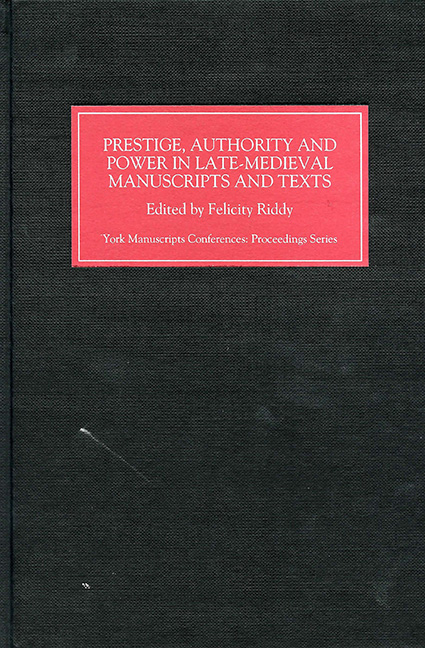Book contents
- Frontmatter
- Contents
- List of Plates
- Introduction
- Inventing Authority: Glossing, Literacy and the Classical Text
- Manuscripts of Nicholas Love's The Mirror of the Blessed Life of Jesus Christ and Wycliffite Notions of ‘Authority’
- The Patronage and Dating of Longleat House MS 24, a Prestige Copy of the Pupilla Oculi Illuminated by the Master of the Troilus Frontispiece
- Limner-Power: A Book Artist in England c. 1420
- A Poet's Contacts with the Great and the Good: Further Consideration of Thomas Hoccleve's Texts and Manuscripts
- The Politics of Book Ownership: The Hopton Family and Bodleian Library, Digby MS 185
- Piety, Politics and Persona: MS Harley MS 4012 and Anne Harling
- The Abbess of Malling's Gift Manuscript (1520)
- ‘Plutarch's’ Life of Agesilaus: A Recently Located New Year's Gift to Thomas Cromwell by Henry Parker, Lord Morley
- Manuscripts after Printing: Affinity, Dissent and Display in the Texts of Wyatt's Psalms
- Index of manuscripts
- Index of names and titles
- York Medieval Press: Publications
Manuscripts after Printing: Affinity, Dissent and Display in the Texts of Wyatt's Psalms
Published online by Cambridge University Press: 24 October 2017
- Frontmatter
- Contents
- List of Plates
- Introduction
- Inventing Authority: Glossing, Literacy and the Classical Text
- Manuscripts of Nicholas Love's The Mirror of the Blessed Life of Jesus Christ and Wycliffite Notions of ‘Authority’
- The Patronage and Dating of Longleat House MS 24, a Prestige Copy of the Pupilla Oculi Illuminated by the Master of the Troilus Frontispiece
- Limner-Power: A Book Artist in England c. 1420
- A Poet's Contacts with the Great and the Good: Further Consideration of Thomas Hoccleve's Texts and Manuscripts
- The Politics of Book Ownership: The Hopton Family and Bodleian Library, Digby MS 185
- Piety, Politics and Persona: MS Harley MS 4012 and Anne Harling
- The Abbess of Malling's Gift Manuscript (1520)
- ‘Plutarch's’ Life of Agesilaus: A Recently Located New Year's Gift to Thomas Cromwell by Henry Parker, Lord Morley
- Manuscripts after Printing: Affinity, Dissent and Display in the Texts of Wyatt's Psalms
- Index of manuscripts
- Index of names and titles
- York Medieval Press: Publications
Summary
Marshall McLuhan had all the press: he coined the smart phrases – ‘the medium is the message’, ‘global village’, and so on – that have continued to reverberate in the popular imagination, thirty years after. As McLuhan acknowledged, however, his own work, from The Mechanical Bride (1951) to Understanding Media (1964), by way of The Gutenberg Galaxy (1962), rested on the thinking of another Canadian (who was McLuhan's Dean at the University of Toronto at one point), Harold Adams Innis. Born in 1894, Innis is remembered chiefly as a political economist and, in Canada, as an early exponent of anti-imperialism in cultural affairs – in the Cold War period, inveighing against what he called ‘the jackals of communication systems’, for example, out ‘to destroy every vestige of [Canadian] sentiment toward Great Britain, holding it of no advantage if it threatens the omnipotence of American commercialism’. Innis turned to the history of communication and communications theory only in the last decade of his life, when, in the late 1940s, he began working with the hypothesis that McLuhan was to do so well out of in the 1960s, that the nature of the media of communication in use influences the nature of the information to be conveyed, thereby determining institutional structures and the course of historical change:
We can perhaps assume that the use of a medium of communication over a long period will to some extent determine the character of knowledge to be communicated and suggest that its pervasive influence will eventually create a civilization in which life and flexibility will become exceedingly difficult to maintain and that the advantages of a new medium will become such as to lead to the emergence of a new civilization.
‘Monopolies of knowledge’, created and fostered by dependence on particular media, grown inflexible and unresponsive, invite subversion: altern- ative media, alternative knowledge, and eventually new social order.
Monopolies of knowledge had developed and declined partly in relation to the medium of communication on which they were built and tended to alternate as they emphasized religion, decentralization, and time, and force, centralization, and space…. Concentration on a medium of communication implies a bias in the cultural development of the civilization concerned either towards an emphasis on space and political organization or towards an emphasis on time and religious organization.
- Type
- Chapter
- Information
- Publisher: Boydell & BrewerPrint publication year: 2000



